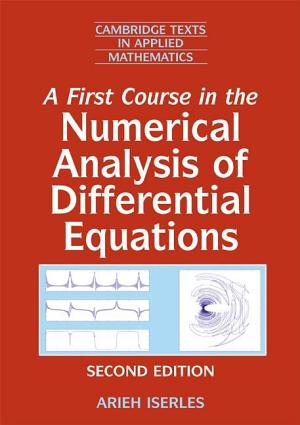Math 450
Numerical Methods for Differential Equations, Spring 2020
Basic Information
Instructor: Ari Stern
Email: stern@wustl.edu
Office: Cupples I, 211B
Office Hours: TuTh 1:30-3pm
Homework Assignments
Problem sets will be posted to Canvas approximately biweekly, and will be collected at the beginning of class on the due date. You are encouraged to discuss the homework with your fellow students and to collaborate on problems, but your final write-up (including code) must be your own. Please make sure that your solutions are written clearly and legibly.
Madison Ihrig (madison.ihrig@wustl.edu) is responsible for grading the homework assignments.
Lectures
Lectures will be held MWF 3-3:50pm, in Cupples II L009. The first class will be on Monday, January 13, and the last will be on Friday, April 24. Class will be canceled for Martin Luther King, Jr., Day (Monday, January 20) and Spring Break (week of March 9-13).
Exams
There will be one in-class midterm exam on Wednesday, March 4. The final exam will be held on Thursday, April 30, from 6-8pm (room TBA).
Grading
Grades will be based on a weighted average of homework (40%, lowest score dropped), midterm exam (20%), and final exam (40%).

Textbook
The text for this course is A First Course in the Numerical Analysis of Differential Equations, by Arieh Iserles, published by Cambridge University Press. I plan to cover most of the material from Chapters 1-5 and 8-9 of the textbook, along with selected additional topics.
Software
The programming component of this class is based on the Python programming language with the SciPy collection of numerical and scientific computing tools. No previous experience with either is assumed (although I will assume familiarity with scientific computing, in some programming language, from Math 449). This software is free and open source, and can be installed on your own computer.
The Anaconda Python Distribution based on Python 3 is officially recommended for this course, and is available for Linux, Mac, and Windows.
Academic Integrity
All students are expected to adhere to high standards of academic integrity, as specified in the undergraduate student academic integrity policy. Since this course is offered through the College of Arts & Sciences, any violations of this policy will be referred to the College’s Academic Integrity Officer. Violations of this policy include, but are not limited to:
- homework collaboration exceeding that permitted in the Homework Assignments section above (e.g., preparing your final write-up side-by-side with another student rather than independently, copying another student's solutions or code);
- submitting the work of others as your own (e.g., copying solutions or code found online);
- exam misconduct (e.g., copying another student's exam or knowingly allowing your exam to be copied, giving or receiving unauthorized assistance, use of unauthorized books/notes or other materials, unauthorized use of electronic devices, etc.).
If you have any questions, or are unsure about what is permitted/prohibited by this policy, please ask me.
In many cases, academic integrity violations are the result of getting behind in coursework and making bad decisions under pressure. Keep up with your assignments, ask questions when you are unsure what is expected of you, and do not give in to the temptation to cut corners.
Catalog Description
Application and analysis of numerical methods for ordinary and partial differential equations. Specific topics may include: Runge-Kutta methods, geometric numerical integrators, finite difference methods, finite element methods, spectral methods, etc. Prerequisites: Math 449 or permission of instructor.